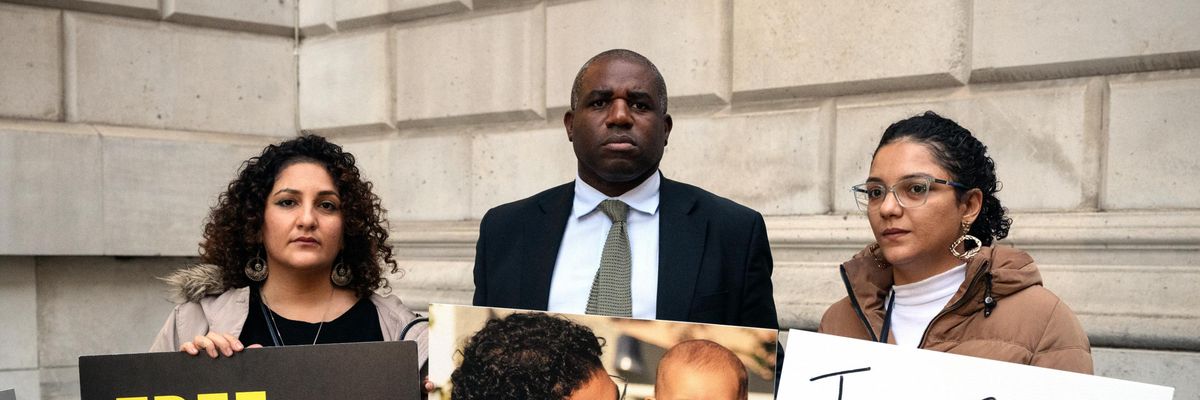A growing global chorus of human rights organizations, Nobel Prize winners, and climate champions is calling on world leaders to pressure the Egyptian government to free dissident Alaa Abd el-Fattah--who is currently on a months-long hunger strike--and other political prisoners ahead of the COP27 summit in Sharm El-Sheikh, arguing that the fights for climate justice and democratic freedoms are inextricable.
In a letter to the head of the United Nations, U.S. climate envoy John Kerry, and other key officials set to attend the climate talks starting Sunday, 15 Nobel Literature Prize winners demanded that the world leaders prioritize the "many thousands of political prisoners held in Egypt's prisons--most urgently, the Egyptian-British writer and philosopher, Alaa Abd el-Fattah, now six months into a hunger strike and at risk of death."
"Unless political freedoms are defended, there will be no meaningful climate action. Not in Egypt, nor anywhere else."
Last December, Abd el-Fattah was sentenced to five years in prison for spreading "false news" after he shared a Facebook post highlighting the torture of another prisoner.
"We urge you to use the opportunity that is now in your hands to help those most vulnerable, not just to the rising seas, but those imprisoned and forgotten--specifically in the very country that has the privilege of hosting you," the Nobel laureates wrote in their letter. "A just transition cannot solely be concerned with bringing down emissions, but must seek a re-construction of the status quo away from exploitation and coercion."
"If the world's leaders gather in Egypt and leave without even a word about the most vulnerable, then what hope can they have?" they added. "If COP27 ends up a silent gathering, where no one risks speaking openly for fear of angering the COP presidency, then what future is it that will be being negotiated over?"
The letter was sent after Abd el-Fattah informed his family in a letter that he intends to stop drinking water beginning November 6, the first day of the climate summit in a country whose government is notorious for repressing dissent.
"I have decided to escalate, at the appropriate time, my struggle for my freedom and the freedom of all prisoners," he wrote, sparking increasingly urgent calls for his immediate release.
In a social media post on Tuesday, author and climate advocate Naomi Klein asked, "If international solidarity is too weak to save Alaa, what hope do we have of saving a habitable home?"
"With the lights flickering in so many democracies around the world," Klein wrote in a column for The Intercept last month, "the message activists should bring to the climate summit, whether they travel to Egypt or engage from afar, is simple: Unless political freedoms are defended, there will be no meaningful climate action. Not in Egypt, nor anywhere else. These issues are intertwined, as are our fates."
Renowned environmentalist Bill McKibben similarly warned that the continued imprisonment of Abd el-Fattah "will make a mockery of the climate talks."
U.S. President Joe Biden and U.K. Prime Minister RishiSunak "have the power to stop this," McKibben wrote on Twitter. "Intervene NOW."
Rights groups have been sounding the alarm for weeks over Egypt's crackdown on peaceful demonstrations ahead of the closely watched COP27 summit, a critical opportunity for world leaders to commit to more ambitious climate action as the devastating impacts of runaway warming become clearer by the day.
In a statement on Wednesday, Human Rights Watch (HRW) noted that "Egypt is hosting COP27 following years of intensifying restrictions on human rights and environmental groups in the country, amounting to one of the harshest government clampdowns in decades."
Richard Pearshouse, HRW's environment director, lamented that "before delegations have set foot in Egypt, authorities have already shown their true colors by clamping down on any Egyptian who dares to call attention to the dire human rights situation in the country."
"In the days ahead, countries should make good on longstanding promises to prevent the most devastating impacts of climate change," said Pearshouse. "At the same time, they should reaffirm to Egypt's government and other authoritarian administrations that independent environmental activism is indispensable for the robust climate policies the world so urgently needs."
"Governments attending COP27 have a responsibility to call out Egypt's rhetoric around tolerance and openness as what it is, empty and meaningless, and to urge Egyptian authorities to end rights restrictions," he added.




